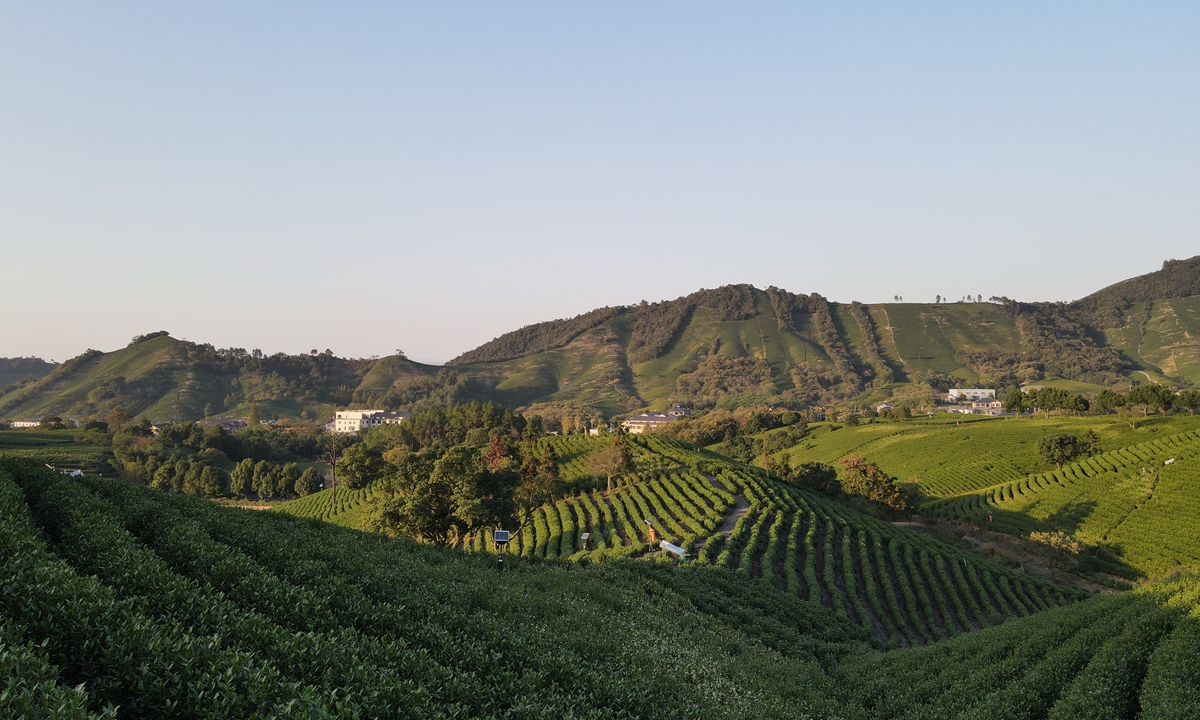China's first 'ecological county' Anji pursues green growth
By Huang Lanlan in Anji Source: Global Times Published: 2020/11/10 0:41:17

Tea plantations in Anji, East China's Zhejiang Province Photo: Lu Ting/GT
The dense bamboo forests and lush tea plantations that surround Anji, a county in East China's Zhejiang Province, first gained fame 20 years ago as the setting for the Oscar-winning movie Crouching Tiger Hidden Dragon.
This renowned eco-friendly county was awarded China's first National Ecological County in 2006 and is hailed as a model for combining economic growth and environment protection. Anji has been one of China's top 100 richest counties for several consecutive years as its three major industries - tea, bamboo and swivel chairs - have grown exponentially.
According to data provided by Anji government, the county, which has close to 700,000 residents, has fiscal revenue of more than 9 billion yuan ($136 million) in 2019, 11 times greater than in 2005.
In the first eight months of 2020, air quality in the county was rated "good" 97.5 percent of the time.
Jia Wei, owner of a tea company in Anji, produces some 7,500 kilograms of tea each year. Raised in Huangdu village - formerly one of Anji's poorest with an annual average per capita income of less than 1,000 yuan in the 1990s - Jia recalled that at that time villagers made a living by cutting down bamboo and selling firewood.
"My parents told me that the most promising thing [I could do] is to leave," Jia said.
Realizing that destroying natural resources won't free local people from poverty, the Anji government started to shift to more environmentally friendly ways to develop its economy. At the turn of the century it started to develop the tea industry in Huangdu village.
This was a smart idea as Anji's air, water and soil is very suitable for growing tea, Jia said. Twenty years later, Huangdu village is renowned for its tea plantations covering more than 650 hectares that surround the village.
Jia returned to Anji in 2013 after recognizing there were big business opportunities and potential in the village's growing tea industry. His company, Yumo, earns 5 million yuan annually from tea sales .
"Tea has changed our destiny and enabled us to live a good life," Jia told the Global Times. Statistics show that in 2019, the yearly average per capita income of Huangdu villagers is more than 49,000 yuan, almost 50 times more than in the 1990s.
Over the past two decades Anji has also required its local manufacturing industries to adapt to new environmental protection requirements. It closed more than 30 local polluting enterprises within the years, including a paper-making factory that contributed a third of the county's tax revenue.
DaKang, one of Anji's 800 largest swivel chair manufacturers started to replace some of its raw materials with more eco-friendly ones in 2000. The company exports 70 percent of its swivel office chairs.
"We stopped using animal leathers, and replaced the traditional paint with a healthier veneer," DaKang's deputy general manager Yuan Guofei told the Global Times, saying that both their products and manufacturing processes meet EU and US standards.
Known as "hometown of swivel chairs," Anji's 800 swivel chair manufacturers reportedly produce a third of the world's swivel chairs. With joint efforts by both the local government and manufacturers, the swivel chair industry has become Anji's pillar eco-industry, with energy consumption per 10,000 yuan of GDP at 0.1 ton of standard coal, far less than Zhejiang's average of 0.67 ton.
Anji's other major manufacturing industry -bamboo furniture - has also upgraded its production concerning energy conservation and pollution reduction. Xiao Kesi, a director of Anji-based bamboo flooring maker Zhejiang Yongyu Home Furnishings, said that the company had transformed its bamboo-boiling equipment from coal-fired boilers to steam machines to decrease carbon dioxide emissions.
"Those who don't embrace green development will eventually be eliminated from the market," Xiao told the Global Times, saying that they keep improving the materials and production processes to meet customers' demand for a healthy lifestyle.
"The concept of environmental protection is deeply rooted in our customers' mind nowadays," Xiao said. "For enterprises, choosing green growth is a way to grasp both economic and ecological benefits."
Posted in: ENVIRONMENT